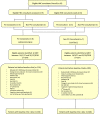Improving quality of life through the routine use of the patient concerns inventory for head and neck cancer patients: baseline results in a cluster preference randomised controlled trial
- PMID: 32488378
- PMCID: PMC7647987
- DOI: 10.1007/s00405-020-06077-6
Improving quality of life through the routine use of the patient concerns inventory for head and neck cancer patients: baseline results in a cluster preference randomised controlled trial
Abstract
Purpose: The main aim of this paper is to present baseline demographic and clinical characteristics and HRQOL in the two groups of the Patient Concerns Inventory (PCI) trial. The baseline PCI data will also be described.
Methods: This is a pragmatic cluster preference randomised control trial with 15 consultant clusters from two sites either 'using' (n = 8) or 'not using' (n = 7) the PCI at a clinic for all of their trial patients. The PCI is a 56-item prompt list that helps patients raise concerns that otherwise might be missed. Eligibility was head and neck cancer patients treated with curative intent (all sites, stage of disease, treatments).
Results: From 511 patients first identified as eligible when screening for the multi-disciplinary tumour board meetings, 288 attended a first routine outpatient baseline study clinic after completion of their treatment, median (IQR) of 103 (71-162) days. At baseline, the two trial groups were similar in demographic and clinical characteristics as well as in HRQOL measures apart from differences in tumour location, tumour staging and mode of treatment. These exceptions were cluster (consultant) related to Maxillofacial and ENT consultants seeing different types of cases. Consultation times were similar, with PCI group times taking about 1 min longer on average (95% CL for the difference between means was from - 0.7 to + 2.2 min).
Conclusion: Using the PCI in routine post-treatment head and neck cancer clinics do not elongate consultations. Recruitment has finished but 12-month follow-up is still ongoing.
Keywords: Cluster preference; Head and neck cancer; Health-related quality of life; Intervention; Patient concerns inventory; Prompt list; Randomised trial.
Conflict of interest statement
We do not have financial disclosure or any conflict of interest.
Figures
References
-
- Handle on QOL https://www.handle-on-qol.com/Index.aspx. Accessed 1 Feb 2020
Publication types
MeSH terms
Grants and funding
LinkOut - more resources
Full Text Sources
Medical
Research Materials
Miscellaneous




